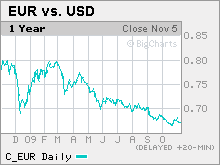Dollar weakens broadly
The greenback tumbles against rivals after an IMF report suggests it could fall further and the G-20 is mum on the U.S. currency's decline.
NEW YORK (CNNMoney.com) -- The dollar fell broadly Monday, with the euro climbing above $1.50, after a report from the International Monetary Fund suggested the U.S. currency could fall further.
The greenback was also under pressure after a weekend meeting of the G-20 failed to address the greenback's ongoing decline.
Overseas stock markets rallied and U.S. stock futures were signaling a strong opening when trading begins in New York.
The dollar index, which gauges the greenback's value against a basket of currencies, fell 0.8% to a two-week low of 75 from 75.77.
The IMF said the dollar "remains on the strong side" despite recent declines, and that the greenback is now serving as "the funding currency for carry trades."
The so-called carry trades, in which investors use the currency of a country with low interest rates to fund investments in more risky markets, have helped push the euro and emerging market currencies higher, the IMF said.
The 16-nation currency was up 0.9% versus the dollar to $1.4987 after rising above $1.50 for the first time since Oct. 26. The U.K. pound was up 1% against the dollar to $1.6780.
The Group of 20 major economies ended a weekend meeting in Scotland without mentioning the dollar in their communiqué. But the G-20 did announce a "framework" in which they will discuss how to reduce trade and savings imbalances between nations.
The G20's decision to focus on fiscal policy, leaving monetary policy unchanged, "highlighted that global leaders continue to believe that it is too early to implement an exit strategy and that the commitment to global growth remains the priority," said Camilla Sutton, currency strategist at Scotia Capital in Toronto.
"We think this will re-focus markets on relative interest rates," Sutton said.
Last week, the Federal Reserve announced plans to hold interest rates at historic lows near 0% for an "extended period." The expectation for low interest rates going forward was reinforced Friday when the U.S. government said the nation's unemployment rate rose to 10.2%
As other nations move to raise interest rates, analysts say the dollar will continue to be used to fund carry trades, which could push the greenback even lower.
Meanwhile, the dollar continues to suffer as investors' appetite for risk grows and demand for the greenback as a safe haven wanes.
Stocks and commodities rallied Monday, with the price of gold hitting another all-time high and oil prices gaining more than $1 a barrel.
The Japanese yen, which is also seen as a safe haven, was slightly lower versus the dollar at ¥89.91 . ![]()



